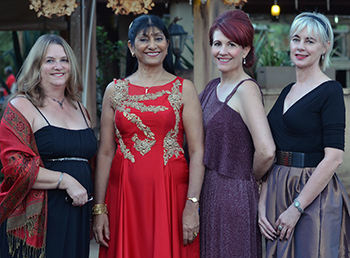
The University of the Free State Faculty of Law, in conjunction with the International Association of Women Judges (IAWJ) South Africa Chapter, hosted a gala dinner on 25 February 2017, in Bloemfontein, to raise awareness on the development programmes that women judges in South Africa, and specifically in the Free State, are involved in.
Focus on development of upcoming legal professionals
The event was a glamorous occasion attended by high-ranking officials in the Free State judiciary and Faculty of Law staff and students. Central to the evening’s events was the launch and presentation of the IAWJ/UFS Faculty of Law bursary that was presented to Mbali Mathebula, who is enrolled for an LLM at the UFS in 2017. Judge Mahube Molemela, Judge-President of the Free State High Court, and Chancellor of the Central University of Technology (CUT), presented the bursary to Mbali, commending her for choosing a poignant research thesis that focused on the rights of children with disabilities in South Africa. Judge Molemela expressed the importance of perseverance through study, and self-development as the key to a successful career in Law.
Transformation in the legal profession still a challenge
Some of the speakers of the evening included Prof Caroline Nicholson, Dean of the Faculty of Law and programme director, Judge Soma Naidoo, who gave introductory remarks, and Judge Mandisa Maya. In her remarks, Judge Maya outlined some of the prevailing challenges that women judicial officers still face, despite decades of reforms in the legal profession. She said: “Women in the judiciary are torchbearers who inspire and empower others, especially young women, and should strive to achieve high moral standards and exceptional scholarship.”
IAWJ mentors upcoming legal professionals
Judge Naidoo said the association had, over the past seven years, partnered with universities such as UFS, University of Pretoria (UP), University of South Africa (Unisa) and University of Cape Town (UCT) to support students through social outreach programmes. She noted the involvement of corporates and other legal professionals as key to their success. Judge Naidoo said the IAWJ had been instrumental in providing training for legal professionals in areas such as trafficking in persons across the Southern African Development Community (SADC), supported by the US Embassy in Pretoria, and had held health and wellness programmes for legal officers around the country.
The gala dinner was a celebration of the successes of the association over the years, and an opportunity to reflect on the important issues that women face in the legal profession, as well as a call to action for students and young legal professionals. The proceeds from the evening will be used to further mentor and develop law students around the country.